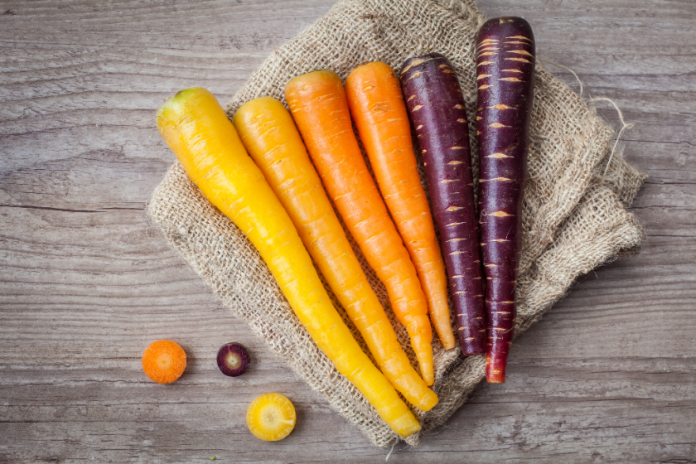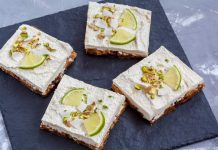
Do you remember as a child (or even as an adult) being told that eating carrots could improve your eyesight? That’s not an old wives’ tale, and it’s also not the only health benefit of carrots. We will explore those in a moment, but let’s take a closer look at these crunchy veggies first.
Carrots are a global vegetable, as they are enjoyed by people around the world. Whether you prefer the common orange carrot or long to sink your teeth into the more exotic yellow, white, red, or purple varieties, there are plenty of health reasons why you should crunch more carrots.
The skinny on carrots begins with the presence of carotenoids, the potent antioxidants that give the vegetables their color. Perhaps the best known of these antioxidants is beta-carotene, which is a precursor to active vitamin A. If we had to point to one thing that makes carrots so healthful, it would be beta-carotene, since it plays a huge role in enhancing the immune system, fighting cell-damaging free radicals, and helping prevent eye and skin problems. In fact, one cup of carrots contains more than 400 percent Daily Value of vitamin A.
Other nutrients in carrots include vitamins C, D, E, and K, as well as calcium, magnesium, manganese, and potassium. Several B vitamins also make their appearance. Throw in their high fiber content, and it’s easy to see how carrots certainly hold their own when it comes to nutrition.
How do you like your carrots?
Since carrots are so nutritious, it’s a vegetable that parents like to try to get their kids to eat. One good thing about carrots is that you don’t necessarily need to chew them-raw or cooked–to enjoy their benefits. Carrots are one of just a few vegetables that can easily be enjoyed as a juice on its own (but it is higher in sugar than other vegetables so if you are trying to limit your sugar intake you may want to consider juicing other veggies, like green vegetables), or mixed with other veggies and fruits in juices, smoothies, and soups. When you juice carrots, you treat your body to a concentrated dose of health benefits. (See the carrot juice recipes at the end of this article!)
Carrots also can easily be introduced into other foods that kids love, such as muffins, cookies, burgers, and DIY frozen fruit pops.
7 Health Benefits of Carrots
Carrots for better eye health. Carrots contain three carotenoids-beta-carotene, lutein, and zeaxanthin, that have been shown to enhance eye health. Beta-carotene, for example, is associated with prevention of eye problems, including blindness and macular degeneration, while lutein and zeaxanthin are known to help with cataracts, glaucoma, and age-related vision loss.
Free-radical killers. The carotenoids in carrots are killers-of free radicals, that is. The beta-carotene, lutein, zeaxanthin, and vitamin C in carrots are a super way to enhance immune system functioning so it can better fight disease-causing bacteria, viruses, and inflammation and protect your DNA from damage.
Reduced risk of cardiovascular disease. The antioxidants in carrots are believed to be the driving force behind their ability to reduce risk of cardiovascular disease, including heart disease, stroke, and high blood pressure. Carrot juice in particular can help in this regard, according to numerous studies, including one from Texas A&M University. The authors of that study noted that drinking carrot juice daily for three months resulted in a decline in systolic blood pressure and a decline in the production of a marker (malondialdehyde) for cardiovascular disease.
Carrots also have been shown to lower cholesterol and increase the production of bile, which boosts the ability of the body to digest fats.

Read about 5 key nutrients for cardiovascular health
Protection against various cancers. A number of studies involving carrots and different cancers have indicated they may provide some protection against these diseases. One study of breast cancer, for example, named carrots as providing a reduced risk of the disease. Another study from Brigham and Women’s Hospital reported that eating raw carrots was “strongly related” to a lower risk of ovarian cancer.
Carrots support oral health. Eating carrots supports oral health on several levels. One, when eaten raw after meals, carrots help remove plaque. The fiber in the carrots enhances immune function, which helps the body fight bacteria and other pathogens that can affect the gums and teeth. Carrots also contain minerals that work to prevent cavities and gum disease.
Protects brain health. Both carrots and carrot juice have demonstrated an ability to reduce oxidative stress in the brain. Since this form of stress is associated with cognitive decline, including carrots in your diet may help prevent memory problems and dementia.
Enhances skin health. Did you know that people used to make a poultice from cooked carrots to heal wounds? The high beta-carotene content in carrots facilitates wound healing and skin health by fighting infections and inflammation. Note: eating carrots and drinking carrot juice provides these benefits as well.
Carrot juice recipes
Because carrots are a root vegetable, the part of the plant you eat has constant contact with the soil. If that soil is contaminated with pesticides, the carrot absorbs them readily. Therefore, always use organic carrots, especially when making carrot juice. Scrub the carrots well but do not peel them unless necessary, because the outside of the carrot contains many nutrients as well.
You can make carrot juice in a juicer or a high-speed blender. If using a blender, you will need a fine-mesh strainer to collect the pulp. After washing the carrots, cut into 2- to 3-inch pieces.
Here are two recipes to get you started.
Basic Carrot Juice (serves 2)
1 cup carrot pieces
½ cup ice cubes
1 cup water
½ tsp grated ginger (optional)
½ Tbs fresh lemon juice
Place all ingredients in your blender and pulse for 60 to 90 seconds or until smooth. Strain and serve immediately.
Carrot and Celery Juice (serves 2)
2 large carrots, quartered
½ small onion, quartered
1 clove garlic
2 stalks celery, quartered
1 small apple, cored and quartered
¼ to ½ cup cold water (depending on desired consistency)
Pinch of ground turmeric
Ice as needed
Feed the carrots, onion, garlic, parsnip, and apple through the juicer. Stir in the turmeric and water and pour over ice if desired. Serve immediately.
Cheers!
References
Abdel-Aal el-SM et al. Dietary sources of lutein and zeaxanthin carotenoids and their role in eye health. Nutrients 2013 Apr; 5(4): 116-85
Axe J. Top 7 ways carrot and carrot juice benefit your body.
Guizar JM et al. Association of alimentary factors and nutritional status with caries in children of Leon, Mexico. Oral Health & Preventive Dentistry 2016; 14(6): 563-69
Lee H-J et al. The effect of carrot juice, beta-carotene supplementation on lymphocyte DNA damage, erythrocyte antioxidant enzymes and plasma lipid profiles in Korean smoker. Nutrition Research and Practice 2011 Dec; 5(6): 540-47
Manayi A et al. Lutein and cataract: from bench to bedside. Critical Reviews in Biotechnology 2016 Oct; 36(5): 829-39
Nicolle C et al. Effect of carrot intake on cholesterol metabolism and on antioxidant status in cholesterol-fed rat. European Journal of Nutrition 2003 Oct; 42(5): 254-61
Potter AS et al. Drinking carrot juice increases total antioxidant status and decreases lipid peroxidation in adults. Nutrition Journal 2011 Sep 24; 10:96
Schagen SK et al. Discovering the link between nutrition and skin aging. Dermatoendocrinology 2012 Jul 1; 4(3): 298-307
Zhang CX et al. Greater vegetable and fruit intake is associated with a lower risk of breast cancer among Chinese women. International Journal of Cancer 2009 Jul 1; 125(1): 181-88










